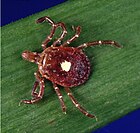Margaropus
Appearance
| Margaropus | |
|---|---|

| |
| Dorsal view of Margaropus female, with inset of male posterior below | |
| Scientific classification | |
| Kingdom: | |
| Phylum: | |
| Class: | |
| Subclass: | |
| Order: | |
| Family: | |
| Genus: | Margaropus Ferdinand Karsch, 1879
|
| Type species | |
| Margaropus winthemi | |
Margaropus is a genus of ticks, characterized as inornate, having eyes, lacking festoons, and with the legs of the male increasing in size from pair I to IV with the segments enlarged, giving them a beaded appearance, from which the genus name was taken, margaritopus signifying beady-legged;[2] the species name memorialized naturalist and entomologist Wilhelm von Winthem.
The genus currently includes three species:[3]
- Margaropus reidi, Hoogstraal, 1956, the Sudanese beady-legged tick[4]
- Margaropus wileyi, Walker & Laurence, 1973, the East African giraffe tick[5]
- Margaropus winthemi, Karsch, 1879, the South African winter horse tick or beady-legged tick[6]
In their native range, Margaropus species ticks parasitize larger land animals, including the three largest southern African wild ruminants, giraffes, Giraffa camelopardalis; African buffaloes, Syncerus caffer; and common eland, Taurotragus oryx.[7]
See also
[edit]Wikispecies has information related to Margaropus.
References
[edit]- ^ Guglielmone, A. A., et al. (2010). The Argasidae, Ixodidae and Nuttalliellidae (Acari: Ixodida) of the world: A list of valid species names. Zootaxa (2528), 1-28.
- ^ Nuttall, George Henry Falkiner. ticks a monograph of the ixodiodea. CUP Archive.
- ^ "ADW: Margaropus: CLASSIFICATION". animaldiversity.org. Retrieved 2023-10-26.
- ^ H. Hoogstraal. 1956. African Ixodoidea. I. Ticks of the Sudan (with special reference to Equatoria Province and with preliminary reviews of the genera Boophilus, Margaropus and Hyalomma). Research Report NM 005050.29.07, Department of the Navy Bureau of Medicine and Surgery, Washington D.C. 1101 pp.
- ^ Jane B. Walker and B. R. Laurence. 1973. Margaropus wileyi sp. nov. (Ixodoidea: Ixodidae), a New Species of Tick from the Reticulated Giraffe. Onderstpoort Journal of Veterinary Research, 40(1):13-22; https://repository.up.ac.za/bitstream/handle/2263/53664/3walker1973.pdf?sequence=1, accessed June 30, 2018.
- ^ Ferdinand Karsch. 1879. Zwei neue Arachniden des Berliner Museums. Mittheilungen des Münchener Entomologischen Verein, 3:95-96.
- ^ Horak, I. G; Golezardy, H; Uys, A. C (2007). "Ticks associated with the three largest wild ruminant species in southern Africa". The Onderstepoort Journal of Veterinary Research. 74 (3): 231–42. doi:10.4102/ojvr.v74i3.126. hdl:2263/5133. PMID 17933365.

